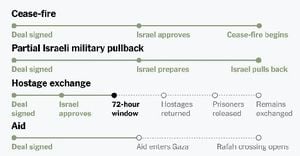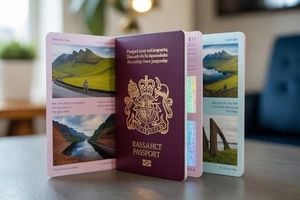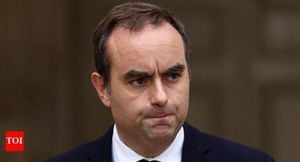For the first time in modern history, British horse racing ground to a halt on September 10, 2025, as the entire industry united in an unprecedented strike against the government’s proposed overhaul of betting tax rates. Jockeys, trainers, owners, and stable staff—normally fierce competitors—stood shoulder to shoulder, making their way to Westminster to lobby Parliament and demand urgent reconsideration of what many are calling an existential threat to the sport.
The catalyst for this dramatic action? A government proposal to harmonise the tax on online gambling, raising the rate paid by bookmakers on horse racing bets from 15% to 21%, bringing it in line with the tax on online casinos and remote gaming. The move, set to be discussed at the November budget, has sent shockwaves through the racing community, with dire warnings about its potential consequences.
“We need every part of our industry—trainers, jockeys, stable staff, racecourses, and fans—to stand together and make their voices heard and I urge people across the sport and across politics to attend Wednesday’s event,” declared Lord Charles Allen, chair of the British Horseracing Authority (BHA), ahead of the Westminster gathering. “We are Britain’s second largest spectator sport, supporting 85,000 jobs and delivering over £4billion of economic value every year. Yet all of this is now being put at risk by a change that would devastate our funding model and the livelihoods that depend on it.”
At the heart of the protest lies not just a tax increase, but a fundamental clash over how the unique nature of horse racing should be recognised in government policy. The government’s plan would combine three existing tax bands—Remote Gaming Duty (21%), General Betting Duty (15%), and Pool Betting Duty (15%)—into a single Remote Betting & Gaming Duty set at 21%. While this harmonisation is intended to simplify the system and level the playing field, racing insiders argue it ignores key differences between their sport and other forms of gambling.
“To align it with online casinos and online poker games that go through the middle of the night, racing’s not like that,” explained trainer Marcus Tregoning in an interview with talkSPORT. “It’s a game that has to be studied and a lot of people put an awful lot of work into finding winners and it’s not a game of chance. A lot of people are employed in our industry, something like 85,000 people and I can promise that this will have serious consequences on our labour force, trainers being able to keep going and the rest of it.”
The BHA’s campaign, branded ‘Axe the Racing Tax,’ has been clear about the potential fallout. Economic analysis commissioned by the authority predicts the tax hike could cost the sport at least £66 million annually, with 2,752 jobs at risk in the first year alone. Over five years, independent forecasts suggest racing could lose £330 million in revenue, forcing cuts across the board—from prize money and jobs to veterinary research and equine welfare.
Paul Johnson, chief executive of the National Trainers Federation, didn’t mince words when describing the stakes. “Numerous businesses depend on a healthy racing industry; these proposals would set us on a path where British racing will lose its world-leading status and international investment will be reduced. The best horses will no longer be bred, owned, trained and raced in Great Britain. The best races will no longer take place in Great Britain. We urge government to recognise these potentially huge implications and instead to look to policies that will enable racing to support the national growth agenda.”
Wednesday’s strike left the British racing calendar completely blank—a rare sight for fans and punters alike. Four major meetings, originally scheduled for September 10 at Lingfield Park, Carlisle, Uttoxeter, and Kempton Park, were rescheduled to alternative dates. The cost of a single day of inactivity? An estimated £200,000 in lost revenue for the industry. Meanwhile, the impact rippled beyond the tracks, with betting shops across the country left without any UK racing to show, and only international fixtures from Cork, Happy Valley, and Compiegne to fill the void.
Jim Mullen, group chief executive of the Jockey Club, which owns both Kempton and Carlisle, highlighted the sport’s unique relationship with betting. “Horse racing has a symbiotic relationship with betting in a way that other sports do not, with bookmakers contributing £350million to British racing annually via the Levy, media rights and sponsorship to fund everything from prize money and jobs to veterinary and equine welfare research. If passed, these government proposals would disincentivise bookmakers from maintaining that level of contribution to our sport and result in a reduction in betting activity on racing. Research shows that this would have wide-reaching and potentially devastating consequences for people’s livelihoods and our industry, which contributes billions to the UK economy every year.”
From the government’s perspective, the proposed tax change is intended to reflect the dramatic transformation of the gambling sector in recent years. According to James Murray, exchequer secretary to the treasury, “The tax system needs to keep pace with the developments and innovation that have seen the UK-facing remote gambling sector change significantly in recent years. Since remote gambling was first developed it has grown exponentially; the three-tax system needs to adapt to reflect the dynamic and expanding nature of the sector. Gambling has increasingly shifted online, with gross gambling yield for remote gambling now at £6.9 billion per year, having seen over 200 per cent growth in the last ten years and 20 per cent growth in the last five years.”
Moreover, a report by the Institute for Public Policy Research (IPPR) estimated that harmonising the tax would raise around £3 billion, potentially allowing the removal of the two-child benefit limit and lifting around half a million children out of poverty overnight. The government, however, has insisted that no final decision has been made. Dan Tomlinson, Exchequer Secretary to the Treasury, stated, “The Chancellor has been clear that speculation on tax rises, which is what this is, is not only inaccurate, but also irresponsible. We have not announced an increase in the tax on horse race betting, and racecourse betting currently gets a 100 per cent tax break which we have no plans to change. We know horse racing is part of the cultural fabric of the country, that’s why it’s the only sector that benefits from a government-mandated levy. Our wider gambling consultation is only about levelling the playing field and simplifying the system, and we are working closely with the industry to understand any potential impacts.”
As the dust settles on a day without British racing, the industry waits anxiously for the government’s next move. With the November budget looming, the stakes for one of Britain’s oldest and most cherished sports have rarely felt higher. The message from racing’s leaders is crystal clear: they’re not just fighting for their livelihoods—they’re fighting for the very soul of the sport.





